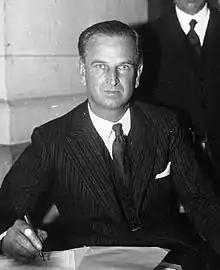Charles Theodore Te Water
Charles Theodore Te Water (4 February 1887 – 6 June 1964) was a South African barrister, diplomat and politician who was appointed as President of the Assembly of the League of Nations.[1]
Charles Theodore Te Water | |
|---|---|
 | |
| President of the Assembly of the League of Nations | |
| In office 1933–1934 | |
| Preceded by | Paul Hymans |
| Succeeded by | Rickard Sandler |
| Personal details | |
| Born | 4 February 1887 Graaff-Reinet, Cape Province |
| Died | 6 June 1964 (aged 77) Cape Town |
Biography
Born in Graaff-Reinet, Cape Province, on 4 February 1887, the son of Dr Thomas Te Water, a South African doctor and politician, Charles Te Water was educated at Bedford School and at Christ's College, Cambridge.[2][3] He became a barrister of the Inner Temple in 1910, and was a member of the Pretoria bar between 1910 and 1929. He represented Pretoria for the National Party in the Union Parliament between 1924 and 1929, and was High Commissioner for the Union of South Africa in London between 1929 and 1939. He was the Union of South Africa's delegate to the League of Nations between 1929 and 1939, and was appointed as President of the Assembly of the League of Nations between 1933 and 1934.
During his time in London, Te Water was close to the other Dominion high commissioners to co-ordinate diplomacy.[4] Starting in May 1936, te Water attended weekly meetings at the house of the Canadian high commissioner Vincent Massey to discuss matters of common concern for the Dominions, and as such te Water became close to Massey together with the Australian high commissioner Stanley Bruce.[4] One result of these meetings was a tendency for the Dominion high commissioners in London was to work together closely to achieve common goals such as pressuring Britain to pursue a policy of appeasement.[4] On 26 September 1938, te Water told the British Prime Minister Neville Chamberlain and the Foreign Secretary Lord Halifax that if Britain should go to war for the defense of Czechoslovakia, it was "unthinkable" that South Africa would also join in.[5] Te Water argued that Czechoslovakia was not worth fighting for, all the more so because Czechoslovakia had signed an alliance with the Soviet Union (which put Czechoslovakia beyond the pale in his opinion), and stated his belief that Britain should find a peaceful way of resolving the crisis.[5] In a dispatch to Pretoria, te Water stated his displeasure with Chamberlain's guarded statements that Britain might go to war if Germany should invade Czechoslovakia, but he also argued that Chamberlain was far preferrable to any of the alternatives such as the Labour Party; the Liberals; the "renegade Tories" such as Anthony Eden and "his paper", the Yorkshire Post and Winston Churchill who was "fishign as always in troubled waters"; and finally the "disloyal" Foreign Office mandarins who were leading Chamberlain "up the garden path" by pushing for a stronger British statements in favor of Czechoslovakia.[6]
He was Ambassador at large for South Africa between 1948 and 1949.[7] Te Water was awarded an honorary doctor of laws degree by Wits University in 1955.[8]
Chancellor of the University of Pretoria between 1949 and 1964, Charles Te Water died in Cape Town on 6 June 1964, at the age of 77.[9]
Books and articles
- Graham Fry, Michael (1999). "Agents and Structures: The Dominions and the Czechoslovak Crisis, September 1938". The Munich Crisis, 1938 Prelude to World War II. London: Frank Cass. pp. 293–341. ISBN 0 7146 8056 7. Unknown parameter
|editors=ignored (|editor=suggested) (help)
References
- Assembly Meeting Time Magazine retrieved 16 May 2008
- Digby, Anne (2007). "Medicine, Race and the General Good: The Career of Thomas N G Te Water (1857–1926), South African Doctor and Medical Politician". Med Hist. 51 (1): 37–58. doi:10.1017/s0025727300000880. PMC 1712363. PMID 17200696.
- Peile, John (25 September 2014). Biographical Register of Christ's College, 1505–1905. Cambridge University Press. p. 878. ISBN 978-1-107-42606-1.CS1 maint: ref=harv (link)
- Graham Fry 1999, p. 298.
- Graham Fry 1999, p. 328.
- Graham Fry 1999, p. 325.
- "te WATER, Charles Theodore". Who Was Who. A & C Black, an imprint of Bloomsbury Publishing plc. April 2014. Retrieved 13 January 2016 – via Oxford University Press.
- "Honorary Degrees". Wits University. Archived from the original on 7 July 2011. Retrieved 30 June 2015.
- Obituary, The Times, 9 June 1964
External links
| Diplomatic posts | ||
|---|---|---|
| Preceded by Paul Hymans |
President of the League of Nations 1933–1934 |
Succeeded by Rickard Sandler |
| Academic offices | ||
| Preceded by Hendrik van der Bijl |
Chancellor of the University of Pretoria 1949–1964 |
Succeeded by Hilgard Muller |